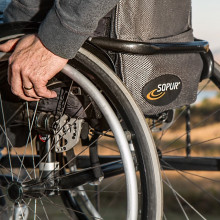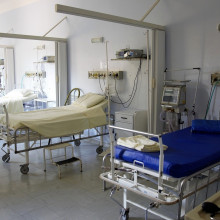Is it time to change the law on assisted dying?
Dame Esther Rantzen reignited the debate on assisted dying in the UK after she shared the news she had joined the physician assisted dying clinic Dignitas in Switzerland. The services offered by Dignitas are illegal here in the UK, but recently some countries have been relaxing their laws in this area. The argument goes, modern medicine has given many of us the gift of much longer lives, so should it also give us the option of a more dignified death? In this episode of the Naked Scientists, James Tytko speaks with those with a personal stake in this debate, medical professionals, and a legal expert to give a sense of the many perspectives on this difficult issue...
In this episode

00:56 - Living with a terminal illness
Living with a terminal illness
Jenny Carruthers
Jenny Carruthers is living with terminal bone cancer. 10 years ago, her partner died of the same condition. Jenny was there to help him through the end of his life and, despite the brilliant care he received, does not want to have to suffer the same pain he did. She told her story to James Tytko...
Jenny - My cancer was diagnosed as terminal three years ago and I've had a chequered journey. I've been a medical professional, and I've cared for my partner through his terminal illness, so I have seen different sides of the debate. I think it is very different when you look from a personal perspective. The debate as an abstract, when it's about ethics, is a really wide one, a really important one. But your perspective changes when it becomes personal. And for me, watching my partner, we had amazing palliative care help, but there were things they couldn't do and it was enormously difficult for myself. I had young children at the time. Hearing him in agony and being unable to help... they couldn't really mitigate his pain. His cancer spread to his bones, which is the same spread that I've got, so I kind of understand where I'm heading and the potential for me to endure the kind of pain that he had. We're on different treatments and my current treatment is amazing, but I am vaguely aware of how difficult it might get, as are my children. And the options for me are limited: either I endure what he did or I leave my children and go abroad and find a little bit of peace earlier, or think about other options. None of them are very palatable.
James - You speak, Jenny, on experiences that are unimaginably difficult. This built on experiences, you mentioned, your time as a medical professional yourself, providing this sort of end of life care for other patients? What are your memories of treating those people?
Jenny - Yes, I worked in an acute gastro ward as a carer, so it was very much hands-on patient care. Some of those patients were at the end of life, they had very serious gastro problems, and it was very difficult for families coming in. You've got six patients in a bay, so there wasn't a lot of privacy. You can make them as comfortable as you can, you can't always give them the privacy of a side room. Understanding that there are other patients that can hear them, that potentially are in a similar position, knowing that that's somewhere their illness might take them as well, is difficult for everyone. Obviously, I'm not a doctor, I don't administer medicine, or I didn't, but asking people to do things, asking people, is there anything else that we can provide and knowing that, really, within our system, there isn't anything else that you can do to alleviate that pain. It's very wearing, very emotionally tiring for everyone who provides care. Our system has limitations and if we could change the law, if it was possible, it would give people more dignity. Not to be able to make the choice personally, to do that for myself or for my partner to do that for himself, it feels unbalanced and it feels like we have to give people another choice.
James - You spoke of some of the shortcomings when it came to some of the care that you were able to provide, or the NHS was able to provide, in contrast to the very high praise you had for the palliative care received by your partner. Is your point here that, obviously we'd love to be able to give the best palliative care to everyone, but regardless of that, there are still some instances where the most sympathetic option is to enable some sort of assisted dying?
Jenny - Yes, that is my belief. At the moment, our system doesn't have every answer and sometimes chronic pain isn't able to be controlled. It just seems that there are kinder ways that we could apply the law and that, whilst our current palliative care tries really hard to cope with all situations, it can't. If the situation were changed, we could be more humane and people could find more dignity at the end.

07:10 - Assisted dying and where it leaves disabled people
Assisted dying and where it leaves disabled people
Tanni Grey-Thompson
Despite calls for a change in the law on assisted dying, some campaigners argue that it might leave some disabled people in a difficult position. Tanni Grey-Thompson is a life peeress, TV presenter, and paralympic champion...
Tanni - As a disabled person, I have some experience of the daily discrimination that people face: lack of access to education, work, transport. For me, I really worry that disabled peoples' place in society is not valued and that disabled people will come out of this very poorly. I've had someone say to me, 'If my life was like yours, I'd kill myself.' I come from, I have a very privileged background but, as a legislator, we're trying to look at all the foreseen and unforeseen consequences, and that's where you do have to look at personal, but you have to look at society as a whole. I'm very concerned about the impact it will have on a huge number of people.
James - People who are proponents of assisted dying will say, if we put safeguards in place where doctors, maybe one or more, can verify someone is of sound mind, why should they not be able to choose an assisted death without implicating their families in a crime or even having to leave them behind and pursue this abroad?
Tanni - So, as an abstract, that sounds inherently sensible. However, who are the doctors? How long do they have to make that judgement? We know that mental capacity legislation hasn't been fully invoked. What sounds very simple comes with a whole range of complications. We have to be mindful. In the last 18 months we passed legislation on coercive control in parliament, and you can't underestimate the fact that people may be coerced into thinking this is the only option. It's awful when you hear of people who've seen and witnessed difficult deaths. We don't talk about death as a country and we need to be supporting people to make sure that they have quality care. In jurisdictions like New South Wales, although that's relatively new, where they've brought in palliative care, budgets have been slashed. So, it sounds very simple, I agree with the principle, but then kick the real decisions into the long grass of secondary legislation? The devil is always in the detail.
James - This is where the debate is, isn't it? There are risks affiliated, of course, with a change in the law on assisted dying, but is it worth it? Is it, as some people argue, a matter of autonomy for people to choose what's best for them in the most personal of circumstances, the case of death?
Tanni - I've been pushed hard on my view on choice because I'll argue about choice for disabled people, but choosing how you live in a society is very different from bringing in legislation, which would have an impact on much wider individuals. It's not an easy one, I do not want anyone to have a bad death absolutely not. But this is a big change in society. If this law comes about, it changes our relationship with people. I believe, if we start talking about the NHS and we need to save money and we need to do things differently, we are not too far from euthanasia. I think we are heading towards a dystopian future if the law is changed.

10:40 - End-of-life specialist argues against assisted dying
End-of-life specialist argues against assisted dying
Baroness Ilora Finlay
The palliative care profession has also expressed concerns about changing the law to allow assisted dying. Here’s Baroness Ilora Finlay, who is a professor of palliative medicine at Cardiff University and has taught end-of-life care internationally...
Ilora - I think it's very worrying to hear about people who are frightened and who see the situation as hopeless, when actually we need to be redoubling efforts to relieve distress. We need to be looking at new ways of managing things. But shortening life, cutting life off, isn't the answer to managing distress.
James - Some people are experiencing pain even the best palliative care is unable to alleviate though, aren't they? I mean, Jenny says of her memories of her husband's care at their hospice, 'We had amazing palliative care help, but there were things they could not do.'
Ilora - I think, when you look at what has happened in other countries that have changed the law on this, you find that there isn't less pain. In fact, the evidence is that the symptom control of unrelieved symptoms is worse, and I think it becomes dangerously easy to think that death is a shortcut rather than actually saying, 'let's look again, what else should we be doing?' When you look at the data from Canada, it shows that the percentage of people who are accessing palliative care has dropped over time. Euthanasia has become normalised, so they get euthanasia, but they're not getting the palliative care options, and actually we don't even know what the quality of palliative care is overall.
James - Another element of this debate is, if you decide assisted dying should be legal in instances where a person is in severe, seemingly untreatable pain, why draw a distinction between people for whom the prognosis is terminal and for those who aren't? I'm thinking of something like severe depression, for example. Legal lines have to be drawn somewhere, and you are of the opinion that where the current law lies in this country is, on balance, for the best.
Ilora - The difficulty is that you can't predict prognosis. Anyone who pretends that they can say someone has a prognosis of six months, they're just guessing. You can't predict how long someone has to live. Some people die much more quickly, others live remarkably much longer. The other thing is that different diseases and disease conditions change and move on. But yes, you are right, there are people with long term, severe chronic pain, and it may take some years for them to adapt. The person who's been in a terrible accident, lost limbs, it may take a long time for them to find a new way of moving forwards. But what you have to ask yourself is 'what's society's duty to people?' Are we there to support people and help them through? Or are we saying, 'well, you are in despair and we'll give up on you,' basically? Or are we saying that we want to support you? If you look at the instance of suicides and look at Victoria, people thought that when they changed the law, it would decrease the number. Actually, that isn't what's happened. The data shows that their unassisted suicide rate has approximately doubled. So something changes in society, but to see death as an answer to fear really seems a very dangerous route to go down.
James - Is there anything that our listeners should be aware of that's happening in the world of palliative care to help alleviate the concerns of people who either have a terminal illness, or know people who have one, that their death will be as dignified as possible?
Ilora - There's research and there are advances in palliative care, but there are also across the whole of medicine with new treatments and new ways of managing conditions, and some of those have really revolutionised conditions. But the other thing that people need to be aware of is that ending life is not simple. The drugs that are used have not been approved anywhere. People don't actually know how they work. Some of the ones used in euthanasia, in about two thirds of cases, the person's completely paralysed so they can't breathe. They die of asphyxia. This is not straightforward. And the complication rate when the drugs are taken for assisted suicide has been up at 11% in the last 12 years in the data from Oregon. So this isn't straightforward. It isn't taking one little pill and it's all over quickly. It actually can be pretty complicated and pretty awful, and we don't even know how this cocktail of drugs that's used is really working and what they're doing and nobody has researched them properly.

16:10 - Doctor makes case for offering an assisted death
Doctor makes case for offering an assisted death
Aneez Esmail, Dignity in Dying
Could we be at risk of the ‘normalisation’ of assisted dying? What is known about the drugs that are used in some countries to help people end their lives. James Tytko put those points to Dr Aneez Esmail who is emeritus professor of general practice at the University of Manchester and a board member of the Dignity in Dying campaign group, who believe that assisted dying for terminally ill, mentally competent adults should be legal in the UK...
Aneez - I'm a bit concerned that she (Ilora Finlay) puts it like that. I think there's a lot of fear mongering going on here, and I think that's wrong. I think we have a lot of experience when we talk to doctors in the US and Australia who provide assisted dying. They give a totally different perspective on this. We have a lot of information about how assisted dying works. If you compare it to a lot of other areas of medicine, and I look after dying patients, it is a bit of trial and error. You do things and it doesn't work as well, you try out other things, that is how medicine works in real life. I'm not denying that there might be individual cases where things haven't gone as smoothly as we'd expect, but in the vast, overwhelming number of cases, from what we have understood and what I've understood by looking at this, is that this isn't the case. I think it's a bit wrong to make out that this is untrialled practice, that we don't know what we're doing, because I think it's based on many years experience from around the world actually.
James - And the argument that some people make that this is a slippery slope, the change in the law Dignity in Dying are proposing, towards normalising euthanasia. Is that a risk? Is there a chance that when we start going down this path, palliative care becomes less accessible or less of a priority?
I don't accept that at all. I was an opponent of assisted dying and my own experience of looking after patients of mine who were dying, that then brought me to the position where I realised that, in a way, assisted dying is part of what palliative care should be about. It's not one or the other, and all the evidence that we have shows that palliative care improves, actually. I think that's the other thing to think about: you might decide when you are given a terminal diagnosis that I want to have that option of assisted dying but, in the end, about 1% I think actually go through with it. But it's sometimes having that peace of mind that, look, if things get unbearable, if my symptoms and my pain can no longer be alleviated, I do have that option as well. So I think that is more often the situation that we are faced with rather than the examples that baroness Finlay gave.
You know, someone who has a catastrophic accident and then decides they want to end their life, I don't think that we have ever talked about in those ways. I'm talking about people who are coming to the end of their life they're going to be dying, typically in my experience, within a few weeks and they are having unbearable suffering. I just don't accept this premise that we'll just flick a switch and say, yes, it's alright. No, I think it's going to be difficult. You've got to have two doctors get involved in it, there's got to be a legal process that you have to go through, which will be quite stringent I think. I think that we can judge, when you have a cancer with metastases which have gone to your brain, to your liver... you're going to hide. This idea that we don't know prognosis, well, I would say that the majority of doctors looking at people like that will tell you that you will probably die in the next two or three weeks. We need to sit down and work on, how are we going to do this? Let's call your family, let's talk to everyone, let's explain what's going to happen. But, in this situation, there would have already been a discussion that, when you get to the point and you can no longer cope, you have to let us know and we can then do the next and final stage.

20:09 - Where does the law currently stand on end-of-life care?
Where does the law currently stand on end-of-life care?
Imogen Goold, University of Oxford
Any change in the law on assisted dying would require new framework and guidance. But what exactly do the statute books say about what medical professionals can and can’t do when someone nears the end of their life? Chris Smith has been spoke to Imogen Goold, a professor of medical law at the University of Oxford...
Imogen - One first principle is that people can never be compelled to have any form of treatment. So, a person who has the capacity to make their own decisions can always simply say, I don't want to take that medication. That may have all sorts of implications for them, one of them might be that they then die. The other strand to that is doctors can never be compelled to give treatment that they consider not to be in someone's interests or that won't have any efficacy, that won't help them. The doctor may take the view that actually there are no treatments left that they think will do anything that will help the person. In those situations they don't have to treat them. These might be treatments that might have kept someone alive for a little bit longer, but they're extremely onerous, they're very burdensome and unpleasant. The doctor might think, well, on balance, this is just not indicated in this case.
Chris - From what you're saying, I could, as a doctor, elect to withdraw support, I could stop giving food and water to a person if I don't think that's in their best interest. But what I couldn't do then is to give them a massive dose of morphine and stop their heart because, it would amount to the same thing, but I would be actively doing something rather than actively not doing something and, although they amount to the same thing, legally that would be different.
Imogen - Yes, absolutely. You absolutely cannot do something that actively has the intention of ending somebody's life.
Chris - But I can not feed them and starve them to death?
Imogen - Yes. That essentially is the nub of part of the euthanasia and assisted dying debate, is that some people take the view that those two things are actually morally equivalent. In fact, it's worse to withdraw treatment from someone and withdraw support from them so that they die over a long period of time, rather than, as they often frame it, the merciful thing of ending their lives more quickly.
Chris - What do you see as the direction of travel? Do you think that we'll still be having this sort of debate in a decade, or do you think that, probably, we will find ourselves in countries like the UK following countries like Switzerland where there are opportunities for people to go down this path if they elect to do so?
Imogen - So I think we've been trying to travel down this path for at least 25 years. There have been measures brought through parliament multiple times to try to push in that direction and they've all obviously failed because it's such a vexed debate. But what we do see at the moment is that the government has undertaken an inquiry and is continuing to undertake the inquiry into assisted dying, so I think there are steps forward towards either resolving the question in favour of changing the law, or drawing a line under the debate and taking a position that it's been thoroughly investigated and the government will take a position. But, which way it will go I think is very difficult to anticipate at this point, precisely because the arguments are quite finely balanced for and against.

23:30 - BMA outlines its neutral stance on assisted dying
BMA outlines its neutral stance on assisted dying
Andrew Green, BMA
The British Medical Association - the trade union for doctors in the UK - have changed their stance on assisted dying from opposition, to one of neutrality. I’ve been speaking to Dr Andrew Green from the BMA’s ethics committee...
Andrew - Back in 2020, we had one of the biggest surveys ever of medical opinion which had almost 30,000 responses, looking at doctors' attitude to physician assisted dying. Now, in a nutshell, what our survey showed is that approximately 50% of doctors felt that there should be a change in the law to make this legal with the other 50% either being opposed or being unsure.
James - Those numbers, such a divide. I suppose that's speaking to the conflict doctors expressing a view on this subject have to weigh up between their commitment on the one hand to do no harm and their instinct to alleviate a patient's suffering.
Andrew - That's correct. And of course, faced with the diversity of opinion within the organisation, it made our traditional position of opposition really one that was difficult to hang on to, and that's why we changed towards one of neutrality. Neutrality is an interesting concept. It doesn't mean in any way that we are disinterested. It doesn't limit our ability to speak out. All it means is that we believe that it's such a fundamental subject that the decision as to whether it should be legalised or not is one for the population as a whole. If society goes down this route, then we have very clear ideas about what would be required to make the system work for doctors and, as importantly, work well for patients. But it's not our decision to make.
James - One of the issues you're going to have to grapple with were the law to change is how would this be implemented in the UK? Would this be a service that the NHS offered?
Andrew - Whether it's an NHS service, we've not actually looked into or have not formulated a specific opinion on. What we do feel very strongly about is that any service should be based on an opt-in model of delivery and not an opt out. In other words, participation in physician-assisted dying wouldn't be something that would just be expected of you as a doctor, it would be provided by doctors who'd taken an active interest in it and have actively opted in to provide the service. Now, that has huge advantages for doctors because it takes the pressure off any doctors who feel that they couldn't participate, but also it would be really good for any patients who do want to access the service because they would be sure that they were engaging with doctors who were interested, who were properly trained, who were working within a proper service that would be resourced and accountable. All of these things would provide protection not only to doctors, but also to patients.
Related Content
- Previous How has sex education evolved?
- Next How languages evolve










Comments
After listening to the
After listening to the PODCAST, my primary takeaway is that people against assisted dying are fearmongering. To state that there is not research on the chemicals used for assisted dying in the USA, Canada, and Switzerland is inaccurate. To state that there is research that will change the outcome or care of people that have terminal bone cancer, which is excruciatingly painful, are misleading people. To infer that palliative care has not been fully explored is not accurate. In my experience, these are people who have exhausted all possible treatments, are in indescribable pain, and whose family supports their desire to end a life that consists of only lying in a bed with full-time care and full-time pain. In the UK, the present law creates a situation in which the wealthy can go to Switzerland or another country, and those without that wealth must continue to die a death that they do not choose.
Great podcast, however the
Great podcast, however the the anti assisted dying arguments came from their standard playbook.
For a long form analysis of assisted dying, including a description of the anti lobby 's standard playbook, listen to Andrew Denton's Australian podcast "better off dead"
https://www.wheelercentre.com/wlr-articles/better-off-dead/
Add a comment